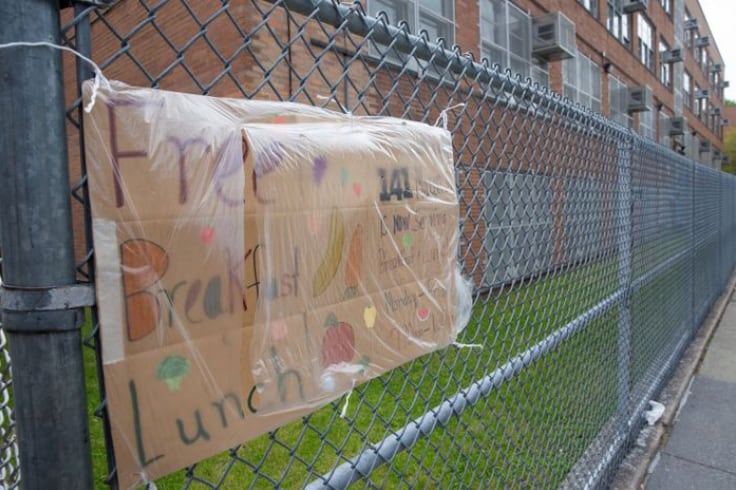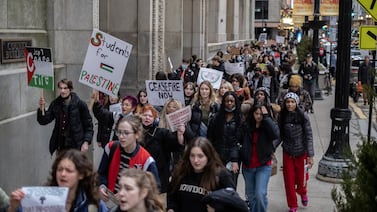All New York City public school families, regardless of household income, will soon receive up to $1,320 in food benefits to help cover the cost of missed school meals while students learned remotely during the COVID pandemic.
The amount of the benefit — called the Coronavirus Pandemic Electronic Benefit Transfer, or P-EBT — will depend on how many days of school a student attended in-person versus online.
Families will receive $82 for each month their child was learning from home one to 12 days. This likely applies to many children who enrolled in hybrid learning, attending school in person some days a week and learning from home the rest of the time to allow for social distancing inside classrooms.
Families will receive $132 for the months their child was out of school buildings for more than 12 days. That includes those who learned exclusively online, which makes up a majority of New York City students.
The benefit is paid per child. So a parent of two fully remote children could get $264 a month.
The funds will start flowing to families immediately, Gov. Andrew Cuomo said at a press conference Monday. The money will be disbursed in two payments. The first should be complete by the end of July, according to the governor’s office, and will cover the cost of school meals missed between September 2020 and March 2021. The second payment is expected to be issued through August, and will cover meals lost from April through June 2021.
Some questions remain: The state did not immediately say whether the reimbursements will factor in classroom or school shutdowns triggered by positive coronavirus cases on campus, which occurred frequently at some schools. Officials also did not say how they would address the prolonged campus closures triggered by rising coronavirus rates. Middle schools in New York City were shuttered for about three months after a spike in cases, while high schools spent four months with buildings closed.
All public school families eligible
Since New York City is a universal school lunch district, providing free meals to every student regardless of family income, every child from 3-K to 12th grade in a city-run public school will receive the benefits. Families in charter schools and private schools who receive free meals through the federal school lunch program are also eligible.
“We know families have been asking for this benefit,” said Rachel Sabella, director of No Kid Hungry New York, an organization that helps tackle childhood hunger. “What the pandemic EBT program means is families will have additional resources to help them feed their children.”
Families do not have to apply to receive the benefit. For those who already receive food assistance, the money will be automatically added to their benefit cards. Children enrolled in Medicaid, whose families successfully used their food benefits last year, will see the money once again added to Medicaid cards. For those who received the pandemic relief funds on food benefit cards last school year during the first round of federal food relief — when all families received about $420 per child — the money will be added to the same card. All others will receive a new benefit card in the mail.
To order a replacement card, call 1-888-328-6399. If the cardholder receives Medicaid through the state’s marketplace, order a replacement by calling 1-855-355-5777.
Families qualify regardless of immigration status, and the benefit will not count against “public charge” rules, under which other benefits could count as a strike against those seeking certain visas or a green card.
Statewide, the program is expected to disburse about $2.2 billion to help families pay for groceries at a time when hunger is on the rise. About one in four New York City children is experiencing food insecurity, according to an estimate from Feeding America.
Benefit helps family and economy
“It’s going to make a real difference,” said Liz Accles, executive director of the nonprofit Community Food Advocates. “It will help people significantly.”
Advocates say these programs not only go a long way towards putting food on the table, but they also provide a boost to the local economy.
Though New York City has set up an extensive network of feeding sites in school buildings, and other nonprofits raced to provide emergency groceries, these programs can have limited hours that aren’t convenient for families. The sites may also offer meals that don’t meet dietary restrictions or other needs, such as pantry stables or formula for infants.
Allowing families to shop for their own groceries helps ensure they get what they need, and also has a well-documented effect of benefiting local businesses. For that reason, advocates encourage families to use the benefit even if they feel secure when it comes to putting food on the table.
“It doesn’t do anyone good not to spend it,” Accles said. “Spend it. You’re doing a service to the New York City economy.”
More food benefits could be on the way, as the state is expected to apply for funding to help feed families over the summer.







